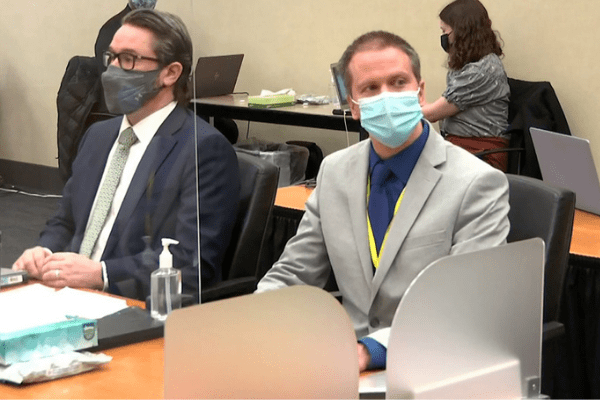Just a few hours ago, Americans across the US erupted into joyous relief as George Floyd’s murderer, Derek Chauvin was found guilty on all counts for his involvement in the 46-year old’s death last May – a crime that reignited the Black Lives Matter movement globally and set off international protests against police brutality and racial injustice.
Chauvin, 45, was convicted of second- and third-degree murder, and second-degree manslaughter. When he returns to be sentenced in eight weeks’ time, the former Minneapolis police officer could be looking at life in prison. Second-degree murder carries a maximum of 40 years, third-degree murder carries a maximum of 25 years, and second-degree manslaughter carries a maximum of up to 10 years.
Crowds outside the courthouse erupted into cheers when the verdict was relayed.
“All three counts! All three counts!” they chanted.
Twitter exploded with multiple hashtags trending, including #DerekChauvinTrial, #GUILTY, #SayHisName, #BlackLivesMatter, #ThankYouGod, “Count 1,” “Accountability”, “ROT IN HELL” and” BAIL REVOKED”
After three weeks of witness testimony — prosecutors called 38 witnesses, defense called seven; the 12 jurors began deliberating on Monday. One of the witnesses was the young female who recorded the widely seen bystander video that brought global attention to the murder. She said that she continues to be haunted by Floyd’s death and that she wishes she had tried to intervene during the incident.
The jurors included seven women and five men from a range of backgrounds and professions. They include a chemist, a youth volunteer, a cardiac nurse and an IT professional. The jury is more racially diverse than the population of where the trial took place – Hennepin County, Minneapolis. Six of them are white, four are Black, and two identify as multiracial.
The prosecuting team argued that Chauvin’s actions caused Floyd to die from low oxygen, or asphyxia, and in their closing arguments, focused the jurors’ attention on the 9 minutes, 29 seconds they say Chauvin knelt on Floyd’s neck.
The defense stated that Floyd’s drug use and pre-existing heart condition contributed to his death and in their closing arguments, said that “the 9 minutes and 29 seconds ignores the previous 16 minutes and 59 seconds” of the incident.
A few days after Floyd’s death on 25 May, 2020, Chauvin had agreed to plead guilty to third-degree murder but the then U.S. attorney general, William Barr rejected the deal because “he was worried that it was too early in the investigation and that it would be perceived as too lenient.”

